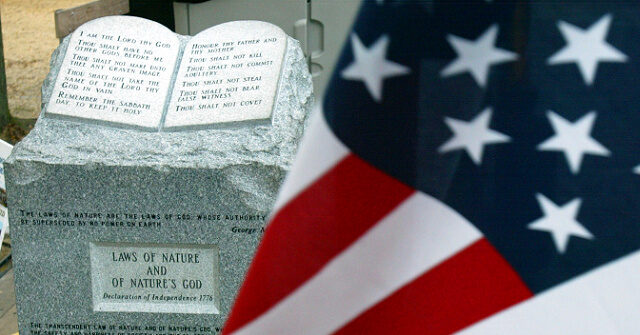
Louisiana Attorney General Liz Murrill (R) stated that she is "looking forward to defending" a law requiring public school classrooms in the state to display posters of the Ten Commandments.
The post Louisiana Attorney General on 10 Commandments in Classroom Law: ‘I Look Forward to Defending’ appeared first on Breitbart.

Louisiana Attorney General Liz Murrill (R) issued a statement that she is “looking forward to defending” a law requiring public school classrooms in the state to display posters of the Ten Commandments.
The bill, which was signed into law on Wednesday, has received criticism from people claiming this violated the separation of church and state.
Louisiana is the first state to pass legislation that requires the Ten Commandments to be displayed not only in public school classrooms but at state-funded universities.
“The 10 Commandments are pretty simple (don’t kill, steal, cheat on your wife), but they also are important to our country’s foundations,” Murrill wrote in a post on X. “Moses, who you may recall brought to 10 Commandments down from Mount Sinai, appears eight times in carvings that ring the United States Supreme Court Great Hall ceiling. I look forward to defending the law.”
The 10 Commandments are pretty simple (don’t kill, steal, cheat on your wife), but they also are important to our country’s foundations. Moses, who you may recall brought the 10 Commandments down from Mount Sinai, appears eight times in carvings that ring the United States… pic.twitter.com/QtQgV9GXWD
— Attorney General Liz Murrill (@AGLizMurrill) June 20, 2024
Under the bill, state funding would not be used for the posters of the Ten Commandments. However, schools are allowed to accept monetary donations or posters of the Ten Commandments that have been donated.
This law comes decades after the United States Supreme Court ruled in November 1980 that a law in Kentucky requiring the Ten Commandments to be displayed in classrooms in the state went against the establishment clause in the First Amendment.
The Cornell Law School website states that the “First Amendment’s Establishment Clause prohibits the government” from being able to make a law that respects “an establishment of religion”:
The First Amendment’s Establishment Clause prohibits the government from making any law “respecting an establishment of religion.” This clause not only forbids the government from establishing an official religion, but also prohibits government actions that unduly favor one religion over another. It also prohibits the government from unduly preferring religion over non-religion, or non-religion over religion.
The bill notes that “in 2005, the Supreme Court of the United States recognized that it is permissible to display the Ten Commandments on government property.”
“In 2019, the Supreme Court of the United States further recognized that the Ten Commandments ‘have historical significance as one of the foundations of our legal system,’” the bill adds.
The displaying of the Mayflower Compact, the Declaration of Independence, and the Northwest Ordinance are also permitted, but not required to be displayed.
Other states such as Texas and Oklahoma have previously attempted to pass legislation requiring the Ten Commandments to be displayed in school classrooms.


